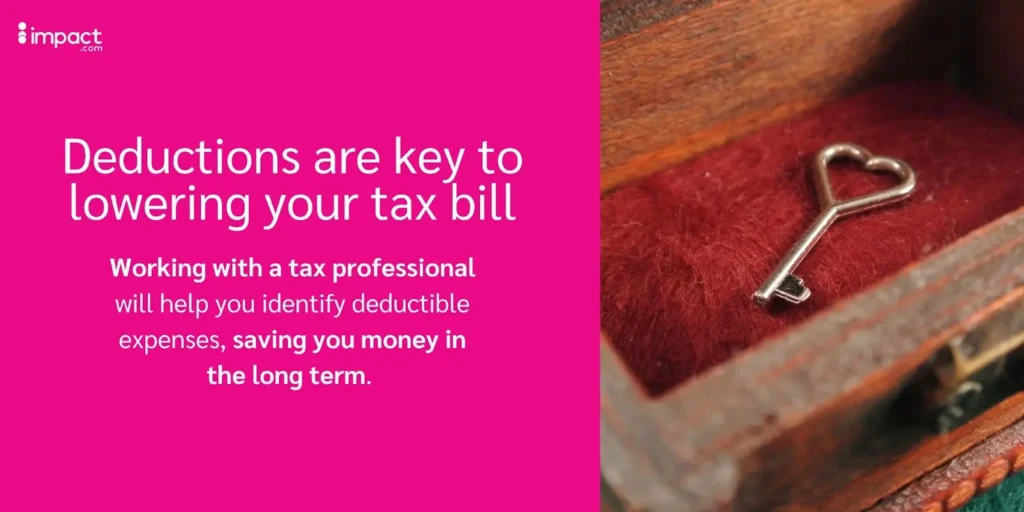TikToker Taylor Chay’s successful brand collab quickly turned into a nightmare when she received an unwelcome surprise in the mail at tax time.
Though she had exchanged her services for a flat fee and gifts, the brand sent her a $63,000 1099 at the end of the year—meaning she unexpectedly owed the IRS almost $20,000.
As a creator, receiving gifts from brands feels like a great perk, but it comes with its own rules and gray areas. Are those gifts really free, or do they come with hidden costs? Understanding your tax obligations is critical for avoiding unpleasant surprises.
Nicole Green, a senior consultant at Robert Hall & Associates specializing in influencer businesses, dove into the complexities of gifting and taxes to help you avoid sticker shock in April.
Disclaimer: This content has been prepared for informational and entertainment purposes only, and is not intended to provide, and should not be relied on for, tax, legal, or accounting advice. You should consult your own tax, legal, and accounting advisors before engaging in any transaction.
Does product gifting count as a form of income?
In the eyes of the IRS, product gifting counts as income for influencers.
Brands aren’t just gifting for the sake of it—they want something in return. As Nicole Green explains, “Brands aren’t gifting items to say ‘Have a Merry Christmas, we love you so much.’ They want you to promote something. If it’s an exchange for something, then it’s income. And whether it’s money, a bag, a trip, or something else, you need to pay tax on it.”

It’s easy to interpret the word ‘gift’ as free, but the terminology is misleading. Believing your favorite brand sent you freebies for nothing in return can land you in hot water.
Some creators might think they only have to declare gifts if they work formally with a brand. But whether you’re under contract or not, the tax rules still apply to these items.
Nicole says, “The contract itself isn’t what makes the gift taxable. It’s you receiving it in exchange for something else. When you get these gifts, they’re like little 1099s. They’re income because they serve as a kind of indirect contract with the brand.”

Determining how much taxes to pay on specific gifts
The laws dictating how much you must pay for your gifts aren’t black and white. It depends on:
- Your business structure (Sole proprietor, LLC, etc.)
- Your location
- How you use the gift
“Knowing the best business structure for your current income and situation can go a long way,” says Nicole. A tax professional can weigh in on the best structure for you and help you navigate other factors that can influence your rate, such as your state tax laws.
It’s your responsibility to know how much tax to pay, so understanding these nuances can help you avoid unpleasant surprises after filing your return.

3 ways influencers can stay compliant with income tax laws and regulations
Navigating tax laws and regulations can feel overwhelming, but following some best practices will help you stay on the right side of the IRS. Here are some tips to keep you compliant.
1. Report all gifts, no matter what
Federal tax law requires you to report gifts valued over $100, but it’s usually better to cover yourself and report everything.
“My stance is that if you’re getting a PR gift, which is not a gift, you need to report it,” says Nicole.
Most companies write off and report product gifts to the IRS as marketing expenses. In other words, these gifts leave a paper trail, and it’s relatively easy for the IRS to find out who received them.

“Failing to report income is serious business. Any poorly done tax return catches the IRS’ attention. Then, when they start digging around, the gifts are very likely to come up in the investigation. If you’re not reporting everything you receive, you could end up paying a price for it.,” says Nicole.
If you’ve skipped reporting gifts in the past without consequence, that doesn’t mean you should continue. As Nicole explains, “usually around year three to year seven is when the IRS will come knocking. They’ll ask for money you owe them, plus fees and daily accumulating interest.“
Reporting all the gifts you receive keeps you safe, avoiding an audit headache and increased tax liabilities.

2. Track received products for accurate reporting
Some brands may send you a 1099 form at the end of the year that reports the value of their gift, but many won’t. It’s on you to track the gifts brands send you and how you use them.
Create a spreadsheet documenting:
- The gifts you receive
- Each gift’s value
- The brands that sent each gift
- What you did with each gift (used, promoted, sold, etc.)
If the brand’s marketing team didn’t mention the gift’s value when they sent it, shoot them a message and ask. Otherwise, you might have to dig around on the website or do general market research to determine how much it’s worth.

Manual tracking can be challenging, but you can strengthen your efforts with robust creator platforms that help you monitor gifts.
For example, using impact.com / creator, you can track the items you receive and their value in the Task Manager. Automating this tracking makes it much easier to see all the gifts you receive through the platform when tax season arrives. You won’t have to dig through endless emails to remember what gifts you received and when.
Shopify brands can sync their product catalog and select products that creators can receive at the campaign level. Creators then choose their preferred product and complete the checkout themselves, directly generating orders in the brand’s Shopify store.
By maintaining a detailed record of the gifts you receive, you can report accurately and avoid unexpected tax issues. A proactive approach helps you stay compliant while focusing on what you do best—creating content.
This highlight from a Partnerships Experience Academy course on the impact.com / creator dashboard shows how creators can easily collaborate with brands on gifted campaigns on the impact.com platform. Learn more about the course.
3. Work with a qualified accountant who understands creator businesses
To get the best returns possible and avoid common problems, you need someone who understands the nuances of creator businesses and how they differ from other models.
A qualified accountant can advise you on how much tax to pay based on your income, business structure, location, and other key factors. They can also help you identify deductible expenses, saving you money in the long term.

“Deductions are the best way to save money on your tax bill—not failing to report income,” says Nicole.
However, knowing which expenses you can write off takes time and effort. “The biggest issue influencers face is mixing work with their daily life. It’s hard to know what you can deduct. For example, haircuts won’t qualify most of the time—the only people who can deduct their haircuts are stylists. People in the army can’t even deduct their haircuts, and they’re mandatory,” explains Nicole.
This is where professional expertise shines. “Working with someone who understands these differences will save you from costly mistakes and potentially help you bring down your tax bill significantly,” says Nicole.

Get compliant with taxes and gifting
Navigating taxes and gifting is complex. Staying informed and organized will help you avoid potential pitfalls. Remember to report all gifts, track them accurately, and work with a qualified accountant.
By following these steps, you’ll stay compliant with tax laws and can focus on growing your creator business with peace of mind.
Ready to partner with like-minded, compliant brands? Sign up for impact.com / creator to find brands open to gifting and sponsorships.
Discover more ways to help your content creation career thrive with these resources:
- Creator analytics: How to prove your worth to land and keep more brand deals (blog)
- Hybrid payments: A path to higher-paying brand sponsorships for creators (blog)
- The recession-proof influencer: How to thrive when marketing spend dries up (blog)
FAQ
Yes, brand gifts count as taxable income, and content creators should report them to the IRS. Even if you didn’t sign a contract, these gifts are part of your earnings. This extends to non-product gifts such as services and trips as well.
Yes, PR packages are considered taxable income. You need to report them and pay taxes based on their value—just like any other gift or payment you receive.
Most brand gifts are taxable, especially if they’re given in exchange for promotion or content. Technically, only gifts over $100 are taxable. However, it’s better to be cautious and report all gifts you receive from brands as income.
Yes, influencers can sell gifted items, but remember that the original value of the gift is taxable. Any profit from selling the item may also be subject to additional taxes.




